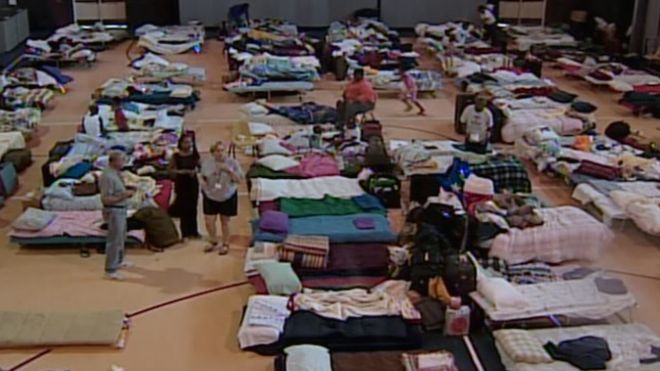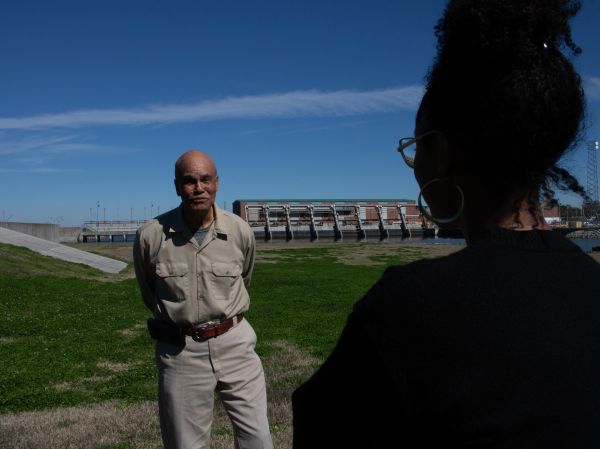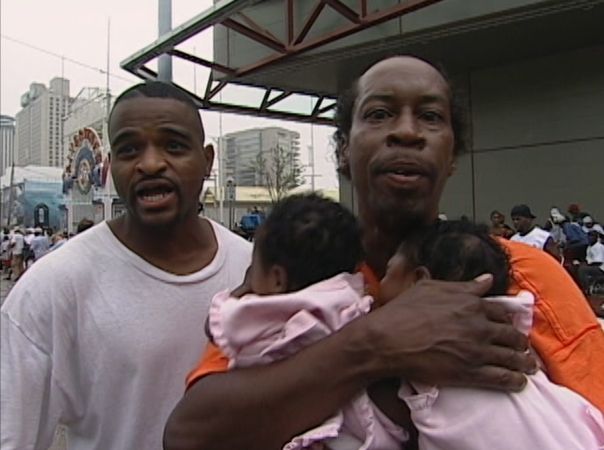Traci Curry’s Docuseries Demands Justice For Black New Orleans
Traci Curry’s Hurricane Katrina Docuseries ‘Race Against Time’ Demands Justice For Black New Orleans [Exclusive]
Share the post
Share this link via
Or copy link

When Hurricane Katrina made landfall in New Orleans on August 29, 2005, the storm ruptured the myth of American preparedness, racial equity, and government accountability. Twenty years later, the trauma remains raw for those who lived through it. In Hurricane Katrina: Race Against Time, premiering July 27 on National Geographic, director Traci A. Curry revisits this national tragedy with unflinching honesty and, crucially, with the survivors at the center of the story.
Produced by Proximity Media (founded by Ryan Coogler) and the award-winning team at Lightbox, this five-part series is a necessary reckoning. Drawing on powerful testimony, searing archival footage, and 20 years of hindsight, the series peels back the glossy rhetoric that often surrounds discussions of Katrina and dares to ask: What really happened, who was left behind, and what did America choose to forget?
Ahead of the docuseries’ debut, MadameNoire had the opportunity to speak with Curry about her vision, her emotional journey, and why Katrina must be remembered not as a weather event, but a human one.
RELATED CONTENT: Get Free 2025 Speaker Deon Haywood On New Orleans, Black Feminism And Thriving When ‘Sh— Hits the Fan’ [Exclusive]
“It wasn’t something that happened to America. It was something that happened to New Orleans.”
Love MadameNoire? Get more! Join the MadameNoire Newsletter
We care about your data. See our privacy policy.
That distinction might seem subtle, but to Curry, it’s everything. “I think one of the first things that occurred to me is that we, meaning us America, the people that were kind of spectators to Katrina, and around the world, remember it as something that happened to America,” she told MadameNoire. “But it wasn’t something that happened to America. It was something that happened to New Orleans and these people in this particular place.”
That revelation didn’t come in the edit bay, but during quiet conversations with residents. Curry visited New Orleans before production began to listen and absorb the emotional weight of Katrina’s legacy. What she found was a city still split in two: before the storm and after. “For those of us who go to New Orleans as visitors, it feels like New Orleans always has,” she explained. “But for the people who are from there, they kind of have this bifurcated experience.”
The Truth Behind the Myth of Chaos
In mainstream memory, Hurricane Katrina is often portrayed as a story of chaos: looting, violence, and anarchy. But Race Against Time challenges that narrative head-on. Through firsthand accounts from residents, first responders, and local leaders, the series reframes those days not as a descent into lawlessness, but as a moment of resilience, community, and yes, abandonment.
From the Superdome to the Convention Center to the rooftops where families waited days for rescue, the docuseries delivers gut-punch after gut-punch. Each episode shares the lived experience of Katrina, exposing not just the floodwaters, but the institutional failures that made those waters fatal.
RELATED CONTENT: Louisiana Ends Lawsuit Against Home-Owning Victims Of hurricanes Katrina And Rita
Episode 1 captures the eerie calm before the storm. Episode 2 reveals how fast the levees failed. By Episode 3, you’re sitting in desperation. And when Episode 4 confronts the infamous “shoot to kill” order, it becomes clear: this was a systemic disaster. In the finale of Wake Up Call, Curry and her team trace the Katrina diaspora and the long, uneven path back home for thousands displaced.
Still, Curry is not interested in spectacle. She’s interested in systems—the quiet, bureaucratic machinations that created the conditions for disaster. “I’m really interested in looking at the ways in which systems and institutions conscribe the circumstances of our lives,” she said. “There’s a tendency to ascribe the origins of race and class-based outcomes to individual actors, because the systems can be really thorny to get your hands around.”
By naming those systems—inadequate infrastructure, racialized poverty, government indifference—the series forces viewers to confront the uncomfortable truth: Katrina was not an anomaly.

Traci A. Curry’s Directorial Evolution
Curry is no stranger to hard stories. Her Oscar-nominated work on Attica already proved her skill at handling emotionally complex material, but Katrina hit differently. As a Black woman, a journalist, and a storyteller, she understood the stakes of getting this right.
Still, Curry doesn’t see Race Against Time as a departure from her past work. “I think it’s kind of on a continuum of my work,” she reflected. “I like to make the invisible visible, the implicit explicit. This series is just an evolution of the kind of things I’m interested in exploring.”
That evolution is clear in how the series is constructed. It’s a people-forward oral history. The voices of New Orleanians are not used for color or commentary. They are the backbone.
Executive producers Ryan and Zinzi Coogler, Sev Ohanian and Jonathan and Simon Chinn, supported that vision from day one. Their combined track record—including Judas and the Black Messiah, LA 92, and Whitney—signals a deep commitment to stories that challenge historical revisionism and uplift marginalized perspectives.
Correcting the Narrative, Centering the People

“This series goes beyond the headlines,” said the Cooglers in a joint statement shared with MadameNoire. “It reveals stories of survival, heroism, and resilience. It’s a vital historical record and a call to witness, remember, and reckon with the truth of Hurricane Katrina’s legacy.”
The truth is messy and enraging, but it’s also rooted in love—the kind that shows up when systems fail. From neighbors sharing food to strangers carrying each other to safety, Race Against Time captures a radical humanity that was too often ignored in real-time coverage.
“It’s far more than a story about a storm,” added producers Simon and Jonathan Chinn. “It’s a compelling, essential reexamination of systemic failure and the enduring consequences of decisions made before, during, and after the levees broke.”
A Wake-Up Call for a New Generation
In 2025, Katrina is taught in schools. It trends on social media every anniversary, but for many, the full truth remains elusive. Race Against Time is restoring history.

With the series debuting across two nights on National Geographic, and streaming in full on Disney+ and Hulu starting July 28, Curry hopes the project serves as both a tribute and a warning. “It’s a wake-up call,” she said. “Because the systems that failed then? They haven’t gone anywhere.”
Hurricane Katrina: Race Against Time dares to do something radical: tell the truth—all of it. For the people of New Orleans, that truth is long overdue.
RELATED CONTENT: ‘The Debutantes’ Director Contessa Gayles On Why Black Girls ‘Don’t Need To Be Perfect Or Broken To Be Seen’ [Exclusive]
Related Tags
Black stories Hurricane Katrina Black voices in Katrina documentary how Katrina changed New Orleans Hurricane Katrina documentary 2025 Katrina 20th anniversary documentary Katrina diaspora docuseries Katrina docuseries Disney+ Katrina levee breach documentary Katrina Superdome documentary Katrina survivors tell their stories Nat Geo Race Against Time review National Geographic Katrina series New Orleans Hurricane Katrina survivors post-Katrina New Orleans today Race Against Time Nat Geo Ryan Coogler Hurricane Katrina systemic racism Hurricane Katrina Traci A. Curry Katrina docuseries Traci Curry National Geographic director what went wrong during Katrina






